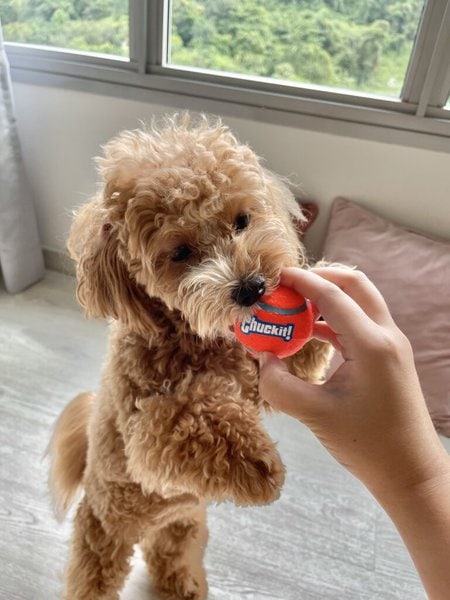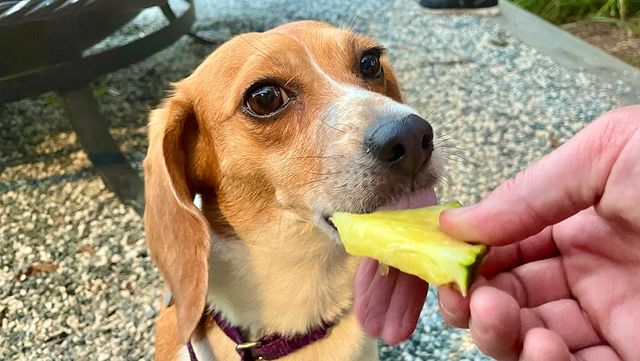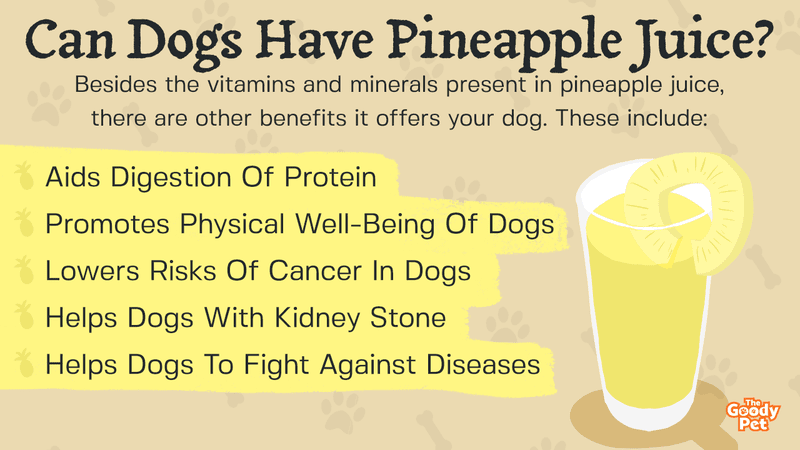It’s one of those hot summer afternoons, and you are headed for a restaurant to chill with a glass of pineapple juice. Your furry companion, being with you, also wants to have a sip, but you aren’t sure if it’s appropriate to give dogs pineapple juice. Can dogs have pineapple juice?
Yes, dogs can have pineapple juice in moderation. Apart from being safe for their consumption, this tropical beverage is packed with vitamin C, manganese, copper, and other beneficial minerals to keep your pup healthy. However, the juice must not contain additives and colorings that often cause digestive problems.
That aside, there is a quantity of pineapple juice that is dangerous to your dog. In fact, there are parts of the fruits that your pup should avoid. Nevertheless, let’s begin with the appropriate quantity of pineapple juice for a dog. How much pineapple juice can your dog have? See the answer below.
How Much Pineapple Juice Can A Dog Have?

The quantity of pineapple juice a dog can have depends on its weight and overall health.
Active and non-diabetic dogs weighing 70 lbs and above can safely take 1 to 1.5 tablespoonfuls of pineapple juice in a day. Smaller and younger canines should consume no more than one tablespoonful in a day.
A cup of pineapple juice contains 0.88 oz of sugar and about 1.2 oz of carbs. As such, you cannot afford to feed your canine with too much of this beverage.
As a general precaution, fruits and vegetables should not exceed 10% of a dog’s daily dietary intake, and only 15% of their daily caloric intake can come from treats. To exceed this bar is to expose your furry friends to digestive and gastrointestinal problems.
There is a popular belief that the enzyme bromelain found in pineapple extracts can discourage or stop dogs from eating poop. How true is this? Check out the truth below.
Does Pineapple Juice Stop Dogs From Eating Poop?
The belief that pineapple juice stops dogs from eating their poop has no scientific backing. As of now, there are no empirical data to affirm that pineapple extracts cure dogs of coprophagia.
Canine conspecific coprophagy is the scientific term used to describe dogs eating poop. It is a learned behavior for many canines and may be normal, and no connection has been established yet between nutrition and this unpleasant habit.
Some dogs eat poop to get their parent’s attention, while others do so because they are voracious eaters. There is also the chance your dog eats its poop because the poop contains undigested foods. If coprophagia is a new habit for your pup, it could be a response to anxiety or another medical condition.
You should see a vet rule out any medical condition and get personalized advice on how to curb this habit. But generally, you can discourage your furry buddy from eating poop by feeding it a nutritious diet and cleaning up its space immediately after it gets soiled.
If we are not sure whether pineapple juice cures coprophagia, what specific benefits does it offer canines? You deserve to know this, which the next section addresses.
What Does Pineapple Juice Do For Dogs?

Unsweetened pineapple juice supplies dogs with helpful vitamins and minerals for optimum health.
Among these are vitamin C, which boosts immunity and fights inflammation, coupled with vitamin B6 needed by dogs to maintain perfect homeostatic conditions.
Besides the vitamins and minerals present in pineapple juice, there are other benefits it offers your dog. These include:
Aids Digestion of Protein
Is your pup suffering from protein indigestion lately? Half a teaspoonful of fresh pineapple juice can help. This tropical fruit juice contains an enzyme group called bromelain, which acts like proteases.
These enzymes break down protein or polypeptide chains into their constituent amino acids, which the body can effectively absorb.
Promotes Physical Well-Being of Dogs
An active dog will find pineapple juice beneficial because of its nutrients. Besides its moderate calorie content, fresh pineapple juice contains significant quantities of manganese, vitamin C, and other essential minerals for physical development.
Lowers Risks Of Cancer In Dogs
Pineapple juice helps in fighting against cancer-causing cells. Based on scientific findings, the enzyme bromelain can decrease tumors and reduce swelling in the joints of dogs. In addition, chemotherapy treatment on dogs is less painful because of this.
Helps Dogs With Kidney Stone
Foods high in oxalate can induce calcium oxide or calcium phosphate stones to form in the bladder or kidneys. Your pet will be physically harmed by calcium oxide or kidney stones.
To keep the dog’s kidney stone problem from worsening, you’ll have to alter its food. If your dog has kidney stones, you should feed him foods low in oxalate, and pineapple juice is one of such meals.
Helps Dogs To Fight Against Diseases
Oxidatively stressed dogs have an unhealthy population of free radicals in their bodies. These free radicals are notorious for weakening the immune system and making their hosts susceptible to chronic diseases like diabetes and inflammations.
Thanks to the antioxidants – flavenoids and phenolic acids – present in pineapples, this tropical juice helps reduce or eliminate free radicals from canines.
Can Dogs Have 100% Pineapple Juice?

Yes, dogs can have 100% pineapple juice, although in moderation. With just one serving, 100% pineapple juice provides a concentrated dose of vital nutrients for your dog’s body.
Because pineapple juice is naturally sweet, 100% pineapple juice has little or no added sugar. Ascorbic acid, another name for vitamin C, is frequently added to store-bought pineapple juice to taste better.
Ascorbic acid currently doesn’t have negative effects on dogs only when given in moderation. Although pineapples naturally have a high concentration of this immune-boosting vitamin, its addition helps to preserve the juice’s flavor and color.
If you consider giving your pooch the fruit rather than the juice, you may want to know what part is safe. We’ll look at this in detail below.
What Part Of The Pineapple Is Safe For Dogs To Eat?
The soft inner portion of pineapple is safe for dogs to eat. Before feeding your dog the fruit, you must remove the spiky outer shell and the hard inner core. A choke or intestinal obstruction can occur if your dog eats these two parts.
Pineapple’s core and skin are particularly brittle, making them a potential choking hazard for your pet. Remove the seeds and only give your dog the fruit’s meat in bite-sized pieces.
Make sure you don’t feed your dog any portion of the pineapple that humans don’t enjoy eating. The pineapple’s skin, core, and crown (the spiky green leaves on top of the fruit) should not be consumed by your dog.
These fruit components are difficult to digest and could cause choking or obstruction in your dog’s digestive tract, necessitating prompt veterinary attention if ingested whole or consumed in significant quantities. Similarly, their fiber content is high and can cause canines to develop constipation.
You can purchase fresh pineapple chunks from the produce section of your grocery store, but these portions are still rather large. If you’re going to feed your dog pineapple, dice it up first. Big pineapples are a choking hazard and can cause an upset stomach if fed in large amounts.
Can Dogs Eat Pineapple Pizza?
A little bit of pineapple pizza will not harm your dog, but it is not recommended because of the often high sugar content and other toppings like onions and garlic, which can be toxic to some pups.
Apart from the toxicity of some pizzas’ ingredients, another setback they cause for dogs is unhealthy weight gain. Pineapple pizzas contain high calories, much of which your dog doesn’t need.
So, if you can, keep pineapple pizza – and other pizza types – away from your furry friends.
Is Canned Pineapple Safe For Dogs To Eat?
No, canned pineapple is not safe for dogs. You may be lucky to find one that doesn’t contain added sugar, but even at that, most of the nutrients would have been lost or diminished during the canning process.
That is not to say that a little bit of canned pineapple would cause your furry friends harm; your pup should be fine if it is a one-off taste or well-spaced. The point is this: don’t make it a habit to treat your canine to canned pineapple.
Canned pineapple can raise your dog’s blood sugar, leading to more complications if it is already diabetic. It may even lead to your pet adding weight and predisposing it to several heart diseases. Fresh self-made pineapple juice remains the best option for dogs.
Where you have no option other than canned pineapple, always make sure you rinse it well with plenty of water before serving it to your dog.
What Happens When Dogs Have Too Much Pineapple Juice?

Too much pineapple juice can cause your dog to develop diarrhea, nausea, and other digestive complications because of the high amount of vitamin C. However, the extent of the effect would depend on how tolerant your pup is to pineapple juice in the first place.
But pineapple juice aside, too much of any food is bad for dogs. Apart from giving their digestive system more work to do, an overload of the vitamins and minerals contained in this juice can affect your pet’s health.
Some of the side effects of excessive consumption of pineapple juice by dogs include:
Constipation
Pineapple juice is high in fiber, which most dogs don’t tolerate in high quantities. It can cause diarrhea, increased stool frequency, and/or urgency to defecate if ingested in significant quantities.
High Blood Sugar
A cup of fresh pineapple juice contains approximately 0.99 oz of sugar. Consuming this regularly and in excess means that your furry friend will be elevating their blood sugar level, which can lead to diabetes and other chronic diseases.
Other side effects possible because of the sugar content in pineapple juice include tooth decay and unhealthy weight gain.
Skin Irritation
Bromelain present in pineapple juice is known to cause skin rashes in dogs and humans when consumed in excess. So, your pooch may find its skin itchy and regularly look for ways to scratch it.
Heartburn
Pineapple juice is acidic, and if your dog suffers from acid reflux, consuming this juice in excess will worsen, leading to heartburn. If this happens, your canine buddy will most often vomit their foods when it gets to their esophagus.
How Do I Choose The Right Pineapple Juice For My Dog?

To choose the right pineapple juice for your dog, check its expiry date and whether it contains added sugar. Fresh pineapple juice without added sugar remains the best.
If you want to make the pineapple juice yourself, you will have to purchase the right pineapple to get the best output. Some things to check out include:
- The Pineapple Size: The bigger it gets, the better the pineapple will be. You’ll get more edible flesh and servings from a single purchase.
- Ripeness: Evenly-riped pineapple is the best as it contains less acid than the slightly ripe or unripe one.
- Physical Appearance: Does the pineapple has brown spots? It has likely started spoiling, and such won’t be appropriate to make the juice you’ll give your dog.
- Odor: Healthy pineapple should not give an offensive odor. Try to smell both ends to ensure it’s not giving out any foul odor.
Once you purchase the right pineapple, you need to use it as early as possible so it doesn’t ferment. You can keep the juice in the freezer if you don’t need it all at once.
What Are The Best Ways To Serve Pineapple Juice To Dogs?
One of the best ways to serve pineapple juice to dogs is to include it in their water. You can mix 1.5 teaspoonfuls of this tropical juice in about 15 oz of water, ensuring that they don’t take too much of it.
You can equally freeze the juice with an appropriate water quantity for a delightful treat during summer, and it would be hydrating and refreshing.
If your dog enjoys vegetable smoothies, you could add a bit of this juice, making it a great snack to lap up.
You must, however, remember to keep the quantity of pineapple juice you feed your pup in check. Whatever dog treat that is not part of a dog’s traditional diet should not constitute more than 10%.





